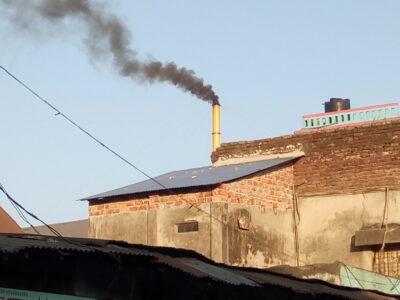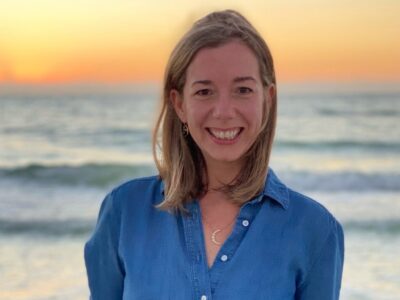
Since graduating from the MPA in Environmental Science and Policy (MPA ESP) program in 2007, Carolina Jaramillo has forged a path in international sustainable development through the United Nations Environment Program (UNEP), the Inter-American Development Bank (IDB) and most recently, through the Global Green Growth Institute (GGGI). Currently, as a Green Growth Program Manager for GGGI, Carolina is responsible for providing the analytics, strategic thinking and support required by governments in Latin America for green growth policies and planning processes to be effectively implemented. Her current focus is in the Amazon Basin and soon she will be moving from Washington, DC to the region to be closer to the projects, challenges and successes. With her recent move to GGGI, Carolina is excited to be working with countries such as Brazil and Colombia, as they are vibrant and growing economies that represent an excellent opportunity – and an exciting challenge – to collaborate with towards green growth.
1. What kinds of work have you done since you graduated from the MPA-ESP program?
After graduation, I worked for UNEP in New York City as a program officer doing inter-agency coordination for a high-level summit on Climate Change sponsored by the Secretary General. I had to prepare briefings on international climate change policy status and progress, draft presentations and interventions to be addressed by high-level officers, coordinate and support a UN inter-agency group responsible of the Summit and facilitate the preparation of the memoirs of the event.
After this high-level policy work, I joined the IDB to support their Carbon Neutral and Sustainability corporate projects. It was a very different kind of skill-set and type of responsibilities, but it gave me a great sense of what it meant to be doing sustainability management at an organizational level. Later on I transitioned towards the operational side of the Bank, supporting the development of Climate Change policy loans and technical assistance in Peru and Colombia. Thereafter, I stepped into the position of Technical Coordinator for the Global Environment Facility at the Bank. From there I had the chance of design projects addressing conservation, climate change mitigation and adaptation and overall natural resources management. It was a great experience to learn the issues countries deal with and are concerned about. I learned the hurdles, lack of capacity and opportunities countries face for making environmental policy work on the ground. My responsibilities also included helping create a portfolio of projects that spanned from energy efficiency, renewable energy, watershed conservation, and sustainable transport to mainstreaming biodiversity into development goals.
2. What aspects of your career have you found most rewarding or challenging, and why?
I feel very privileged to have been in the positions that I’ve had and to see their alignment with my ultimate vision of helping influence decisions and results towards a more sustainable and equitable economic model and planet. Today I find it thrilling to be part of an organization such as GGGI where I can actually foster, elucidate and influence the ways in which governments, private individuals or companies make decisions and support their integration of green growth goals into their economic development and business results they want to generate. At the same time, I find extremely challenging to align social, financial and environmental goals as the framework and sense of possibility is still very foreign to most people and in many cases even completely remote. There is still a lot of political will, technical capacity, education and interest to be created and nurtured for our generation to see the scale of transformation the world is needing before it’s too late from an ecological and social perspective.
3. How did you find your current position? What resources/methods did you find most useful?
I found about the position at GGGI through a friend of a friend, meaning through my network. I think this is a key aspect to encourage in every professional: create your networks, maintain them, nurture them and let them know what you are up to. People will come back to you, point at something for you and eventually propel you to the next thing. In this same way, I have supported many ESP students as they come out of SIPA, try to connect people, look for opportunities that may serve them…it’s all about helping and asking for help when the time comes. Good avenues for this include LinkedIn, alumni networks, and special interest groups that you can affiliate yourself with. It is just important to be engaged with people in your field.
4. What skills and knowledge from the MPA-ESP program have you found to be most useful in your professional career so far?
The program definitely stamped a seal of quality and professionalism to my career that I may not have gained otherwise. I’ve learned to be accurate, strategic, analytical and political. Most importantly, I learned how to work in larger teams and identify what strategies work and don’t work. I also learned to be a quick learner, a concise presenter, and a sharp advocate. I realized the different angles that policies can be seen from and how to manage them as you are trying to push forward a specific agenda or goal. Ultimately, I learned how to look at environmental problems from different angles and what elements are required to be a successful policy-maker that is capable of influencing the course of action towards the larger and better good.
5. How do you intend to utilize your degree from the MPA-ESP program to further your future career?
I’ve already been using it in all my jobs since graduation. The skills I’ve learned I will continue to apply and master. I think one day I would like to come back to SIPA to help students see what’s really important and how to focus their energy and make the most out of this program. Like everything else in life, you get back in proportion to what you put in. I think spending some time to keep present to your intention as you go through the program and leverage all the resources to make the most of it is a lesson I learned and that I think others can benefit from. My goal is to influence policy, investments and every day decisions that will lead towards a sustainable economic model that will ensure a viable planet and world for our generation, that of our children, and our children’s children and so forth. That is a massive challenge, and a very exciting one indeed. Hence, we need to prepare ourselves to step up to producing massive results that can produce the transformation we need to see in the following decades.
Students in the MPA in Environmental Science and Policy (MPA ESP) program enroll in a year-long, 54-credit program offered at Columbia University’s School of International and Public Affairs, in partnership with the Earth Institute. Throughout this one-year program, students are immersed in courses that combine Columbia University’s hands-on approach to teaching public policy and administration with pioneering thinking about the environment. During the summer semester, students learn the fundamentals of environmental science, while in the fall and spring semesters, they focus on the policy and economics necessary to becoming successful environmental analysts and managers. Visit our website to learn more about the program.



